Ricky Ponting lauded Virat Kohli for bringing about a revolution in Indian Test cricket, highlighting his pivotal role in altering the team’s leadership and mentality. India won significant international matches under Kohli’s captaincy from 2014 to 2022, including an unprecedented series victory in Australia.
Virat Kohli has transformed Test cricket in India, according to former Australia captain Ricky Ponting. He mentioned that the change in the national game was mostly due to Kohli’s adoption of the Test captaincy role. Under Kohli’s leadership, which started in 2014 and continued until the beginning of 2022, India prospered. He gave the team a tough cricketing mindset and gave everyone hope that the Indian team might succeed abroad as well. India became the first Asian side to win a Test series on Australian soil under Kohli’s leadership.
They have excellent fast-bowling depth. For the past six to seven years, there has been good leadership. Rewinding to when Kohli took up the captaincy, he was largely responsible for the turnaround in cricket, and in the last four years, Dravid has done the same. They have star players, and having someone like that [Kohli] around a squad would be fantastic, Ponting said to Sky Sports.
Kohli’s term as Test captain
Of the 68 Tests India played under Kohli’s leadership, they won 40, lost 17, and 11 ended in draws. He was one of India’s most successful red-ball cricket captains thanks to his home and away record. But this time, Kohli will travel to Australia as a player, leading the way under Rohit Sharma.
Due to the birth of his daughter Vamika, Kohli had to leave the final series in 2020–21 midway through the first Test. Under Ajinkya Rahane’s leadership, India overcame injuries and the absence of important players to win the series 2–1.
Indians are no longer afraid of the limelight.

Ponting recounted India’s historic victory at the Gabba, the first time an away team has cracked the Australian barrier in 32 years during a Test match. He emphasized the Indian team’s shift in perspective and their bold tactics.
It just doesn’t happen that they win a game at the Gabba. Their batters, in my opinion, adjust to foreign batting circumstances quite well. They may not be as afraid of the Gabba or the Optus Oval as they formerly were, in my opinion. He remarked that it might be a selection issue or that they simply no longer fear the huge stage.
Ponting added that the Indian players’ preparation for the major stage was much aided by the IPL.
Being around the IPL for the past ten years has made me realize that many young guys [never fear the big stage] because the IPL is high-pressure and seems like a World Cup to them. Each of their batsmen is a fierce, accurate striker. He said, “They are not afraid to fail.”








